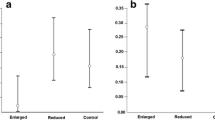Abstract.
In order to assess the importance of breeding experience in shaping age-specific patterns of reproduction an experiment on collared flycatchers (Ficedula albicollis) was performed. Experimental females were restrained from reproduction by destroying their nests after prolonged incubation. Unmanipulated females were used as controls. Only young, first time breeders were considered. A year after manipulation, experimental (inexperienced) and control (experienced) females were compared for a number of breeding traits. They did not differ with respect to laying date, clutch size, number of fledglings and number of local recruits. However, fledglings from broods of inexperienced females were significantly lighter and had shorter tarsi. This suggests that prior experience of feeding young may indeed influence the future reproductive performance in altricial bird species such as the collared flycatcher.
Similar content being viewed by others
Author information
Authors and Affiliations
Additional information
Electronic Publication
Rights and permissions
About this article
Cite this article
Cichoñ, M. Does prior breeding experience improve reproductive success in collared flycatcher females?. Oecologia 134, 78–81 (2003). https://doi.org/10.1007/s00442-002-1099-x
Received:
Accepted:
Issue Date:
DOI: https://doi.org/10.1007/s00442-002-1099-x




